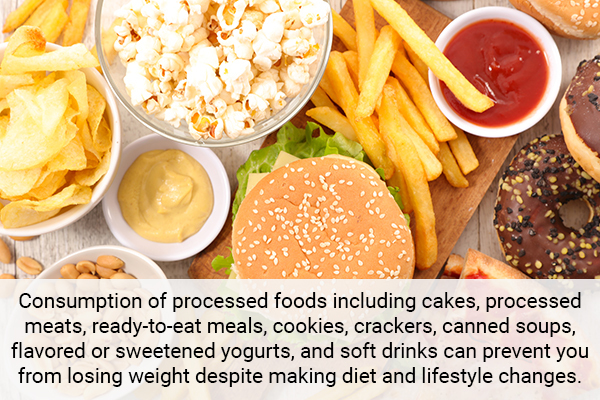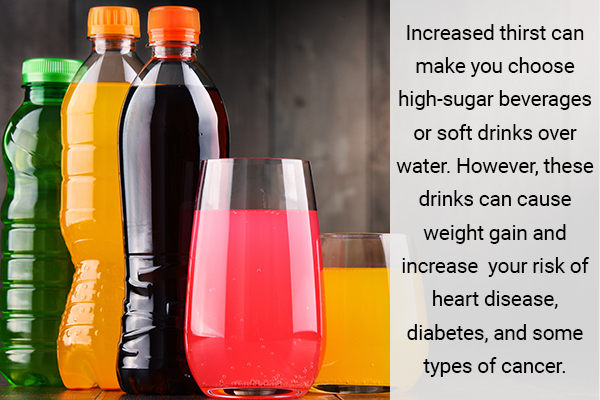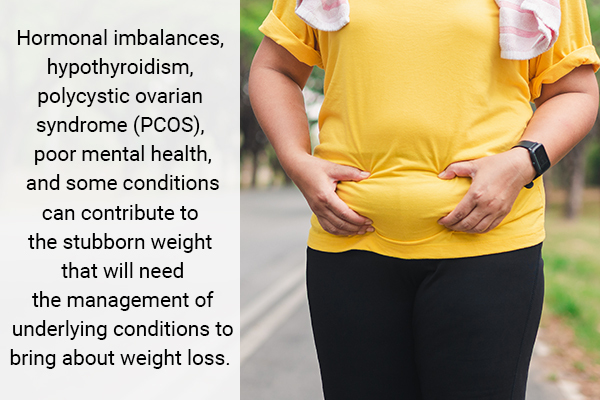In this article:
How many times have you become frustrated with the lack of results when you go on a weight loss diet? You have changed your eating habits and you exercise more than you used to, yet you fail to see desired results.

Several factors can contribute to the stubborn weight that refuses to budge. These include genetics, illnesses, hormones, and medication, among others.
Regardless of these factors, weight loss is a matter of balancing the energy you obtain through food and the energy you spend through physical activity or biological functions.
Due to changes such as insufficient physical activity, undereating, changes in metabolism, or some diseases, the body may hang on to some of its energy, causing a person to not lose the excess weight.
Reasons You Are Not Losing Weight
Here are some of the reasons you may be experiencing difficulty in losing weight.
1. You are not eating enough throughout the day
Skipping meals can seem like an easy way to reduce the calories you eat and lose weight. Oftentimes, it is breakfast that is ignored due to busy morning schedules. However, foregoing breakfast is linked with weight gain and eventually obesity. (1)
Moreover, skipping meals contributes to long gaps between meals, which is another risk factor for obesity. Late lunch can cause difficulty in losing weight, and late dinner can contribute to poor glucose control, yet again adding to weight loss difficulty. (2)
For these reasons, most dietitians will recommend not skipping meals and instead make consume low-calorie foods and meals.
2. You are not enjoying your food

Because of busy schedules and a long list of tasks to finish throughout the day, it can be difficult to make time for meals. However, eating slowly and without distraction can help with weight loss. (3)
Eating slowly reduces the amount of food you eat, reducing the total calories consumed. It also allows you to enjoy your meal more, enhancing satiety and reducing the desire to eat more food.
This was observed in one study, where the group who ate slowly experienced more fullness and had lower levels of the hormone that increased appetite. The group also consumed 25% lesser calories from snacks. (4)
3. You spend most of your time sitting
Spending most of your day sitting due to work or any other activity can cause difficulty in losing weight. Diet and exercise together play a role in energy balance, and while diet changes can help, added exercise is also necessary.
A minimum of 150 minutes or 2.5 hours of moderate physical activity each week is needed to be sufficiently active and to improve heart health. (5)
Recently, standing and walking desks have gained swift popularity and can contribute to daily steps without affecting work productivity. In Japan, desk workers using sit-stand desks for 3 months reported improvements in general health and reduced sedentary behavior. (6)
4. You are eating too much processed foods

Consumption of processed foods including cakes, processed meats, ready-to-eat meals (such as pizzas and pastas), cookies, crackers, canned soups, flavored or sweetened yogurts, and soft drinks can prevent you from losing weight despite making diet and lifestyle changes. (7)
Highly processed foods contain a lot of added sugar and fat and less fiber and protein, contributing to poor nutrition. In addition, the emulsifiers in these foods can cause inflammation in the intestines and alter gut microorganisms. (7)
Instead of consuming processed foods, choose fresh fruits and vegetables, nuts, or whole grain products as snacks.
5. You are not eating a balanced diet
Fad diets such as low carb, high fat, zero fat, liquid, and eating during certain times of the day are popularized as quick ways to lose weight, and you may see some weight loss within the first few days of such diets. However, long-term use of these diets is detrimental to health. (8)
Compliance is a big issue with these fad diets due to the unrealistic restrictions, and some studies have also reported severe micronutrient deficiencies as a result of these diets. (8)
Maintaining a healthy diet with the inclusion of carbohydrates, proteins, and fats is one of the best ways to achieve long-term weight loss in a healthy manner.
6. You have a slow metabolism
Metabolic thermodynamics is the rate at which the body burns the food you eat. It can contribute greatly to the way you can gain or lose weight. Therefore, finding ways to increase the way body spends energy through metabolism can help the weight loss process become effective. (9)
The good news is there are some foods you can consume to boost your metabolism. Include green tea, nuts, cinnamon, turmeric, ginger, and apple cider vinegar in your diet to aid your weight loss effort. (10)
7. You choose high-sugar drinks and sodas over water

Increased thirst can make you choose high-sugar beverages or soft drinks over water. However, these drinks can cause weight gain and increase your risk of heart disease, diabetes, and some types of cancer. (11)
Water is the optimal beverage for hydration. Even replacing one serving of high-sugar drink with water reduces the risk of diabetes and brings about some weight loss. (11)
Drink up to 2 liters of water each day to stay well hydrated and to lose that stubborn weight.
8. You eat out frequently
It can be tempting to eat out after you have followed a healthy eating pattern for a while, to give yourself a break or as a treat. However, eating at both fast food and sit-down restaurants has been linked with increased weight gain. (12)
Eating out can cause you to consume more calories, sugar, salt, juices, or other sugary beverages and low amounts of fiber and other nutrients. (12)
9. You have high levels of unchecked stress
High levels of stress are associated with increased weight and obesity. When the body is stressed, it releases a hormone called cortisol. This hormone can increase appetite and cravings for “comfort foods.” It also increases the deposition of fat into fatty tissues. (13)
Spending time in nature, indulging in a hobby, and spending time with friends or family are all effective ways you can use to manage stress.
10. You are not sleeping well enough

You may focus on food and exercise for losing weight, but good sleep is also just as important.
Several studies have reported lack of sleep or sleep restriction can cause weight gain, high blood pressure, and also insulin resistance. (14) Adults are encouraged to get 7 or more hours of restful sleep to prevent weight gain and obesity. (15)
Most-Asked Questions About Reasons Why You Are Not Losing Weight
I have made all the changes and still I am not losing weight. What can I do?
Consulting your doctor or dietitian may help you identify places where intervention might be needed. Certain underlying conditions such as insulin resistance, consumption of alcohol, and medications could be why you are not losing weight.
Will these tips help me lose weight during pregnancy?
Pregnancy is a time of great physiological change. It is better to avoid going on a weight loss plan during this time. Consult your doctor and dietitian to help you make a plan for healthy weight gain and a diet plan that contains all the necessary nutrients for both you and the baby.
What medical conditions prevent weight loss?

Hormonal imbalances, hypothyroidism, polycystic ovarian syndrome (PCOS), poor mental health, and other conditions can contribute to stubborn weight that will need the management of underlying conditions to bring about weight loss. (16)(17)
However, a recent study also pointed out that there was no association between obesity and subclinical hypothyroidism among patients with PCOS, so more research is needed. (18)
Are genes and heredity responsible for not losing weight?
Genes can cause a person to be more prone to weight gain; however, with proper diet and exercise, this weight can be lost without much trouble. (17)
Can age be also a factor behind not losing weight?
Aging can cause the metabolism to slow down and for the body to lose its muscle tone naturally. Both of these can significantly contribute to weight gain. However, calorie reduction without missing out on nutrients and age-appropriate exercises can be effective in maintaining a healthy weight. (17)
Final Word
Losing weight is a slow uphill climb. Making necessary changes to facilitate weight loss may seem daunting, but most recommendations come with a lot more benefits than just weight loss. It is easy to get discouraged when you don’t see the scale move for a few days, but it doesn’t mean you are doing something wrong.
Evaluating your routine to assess your sleep, the presence of added sugar in the diet, metabolism, deficiency of nutrients, and lack of or poor quality of exercise can all affect how quickly you lose weight.
Remember, the only healthy way to lose weight is if you go about it slowly. Not only will the results be healthy, but they will also be long term.
- Was this article helpful?
- YES, THANKS!NOT REALLY


